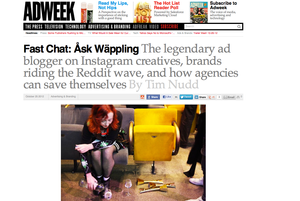"The legendary ad blogger on Instagram creatives, brands riding the Reddit wave, and how agencies can save themselves" in Adweek (archive link)
Åsk Wäppling was blogging about advertising long before most people were blogging about anything. She started what is now Adland.tv back in April 1996. In the 16 and a half years since, she's covered every notable ad agency and marketing trend, big and small, and every major TV, print, outdoor and digital campaign worth seeing. And she's done it all as a side project—with wit, humor, style and more than a little improvisation—while holding down agency jobs around the world.
Born in Sweden and raised in North Carolina, Wäppling—aka Dabitch—is an art director by trade who is now specializing in digital. Having recently moved to the U.S. from Europe, she sat down with Adweek to talk about the state of her site, the (sorry) state of young creatives today, and the future of advertising agencies—if there is one.
Are you still as excited about ad blogging today as you always were?
[Pause] Yeah. I still can't shut up about ads. But at the same time, I'm a little tired of the new crop of people who aren't reading anymore. I call it the "140char" mentality. People can't see the big picture anymore. I can't blame Twitter for it, that's a little passé. But we're constantly connected all the time, so we consume news really fast, and we quip jokes really fast. But we never see the full picture. We never slow down to read an article. And this really frustrates me, because if I've spent the time to write an article, at least spend the five minutes to read it. I'm sure you've seen this, too—people who zone in on one line in your post and pick on that because there's a typo in it, or they disagree on how it's put or something. And they miss the entire point.
You're renowned for your longer posts on advertising issues. So, you think they're just not being read?
I don't think they're read anymore. They used to be read. There's this Instagram generation of ad kids now who are not reading it or understanding how it can affect our future—and by that I mean, their future careers. And they don't really care. There's always been a group of "We don't care" kids in advertising, but it seems like now, all of them are "We don't care" kids. And it bothers me. I don't want them as my interns if they really don't care about the picture, they probably don't care about the big picture of the brand, either. How are they going to sell something?
And it's not just about articles that we write on the web. It's everything we do. If you look at the debates. As soon as Romney said something about binders, there was a Facebook of Mitt Romney's binders, a Tumblr of Mitt's Romney's binders, a Twitter of Mitt's Romney's binders. Did anybody listen to his point? I don't think so. We're dedicated to making these sarcastic quips all the time, but nobody's actually listening. And those who actually have something to say will stop talking. And that's going to be a problem.
Do you think the quality of advertising suffers because of shorter attention spans—not just the people consuming ads but those creating them?
That's a good question. I think it's worse for the people consuming. There's no sense of history anymore. You can't refer to news last week, it's already passé somehow. You see this with all these brands who are trying to do social media. They're just trying to ride a Reddit wave of fun-ness all of a sudden, and they think they score. But I won't remember Bodyform for anything other than they had a really funny CEO. I'm not going to remember them next week, because they haven't told me what Bodyform is. There's no branding left when you're just writing these single jokes. It just seems to me that even advertising on TV today is not taking the long view of the brand.
But you could look at a brand like Oreo, which doing some good viral stuff, but stuff that makes sense.
Exactly. They can comment on stuff that happens during the day, but they're doing it in the classic '80s/'90s way of posters. They're just doing it online. But it's very clever, because it's just centered on the cookie.
Lately, you've been talking a lot about the dangers of relinquishing your personal data on the Internet. What's the harm in that?
It's digital sharecropping. We've been doing this since GeoCities. Web companies will give away the tools for you to post stuff, and then sell the advertising space around it. Now, all these services are doing it. People spend a long time doing their Pinterest boards and their Facebook pages, and you're giving away all this data and information about yourself and spending all this time creating content for somebody else. So, there are six little kids at Instagram who are overnight bazillionaires off your baby pictures.
People should realize that it's a digital serfdom. You're giving away rights to your content. A lot of people say they get something out of it. On Facebook, they get to talk to their friends. At the same time, you can send baby pictures out via email, where nobody's making money off it. You should ask yourself: Can you download all your data? Can you save everything? Can you close this account at any time? Who owns the rights to it? And is it helping the only brand you know will be with you for the rest of your life, which is you? It's one thing if you're a fashion blogger and you're Pinterest blogging. But if you're just Pinterest blogging because it's a good place to save shit, you could do that with folders on your own computer.
Are there lessons for brands to learn here?
Brands are always following everything around. The baby pictures are a media space, and so there are brands putting ads on onesies there. But brands are forgetting one thing, and it's "dark social." We're always aiming for the Twitter social or the Facebook social or the Pinterest social. But dark social is where people are emailing things to each other. And the only time you can get people to share branded links with each other like that is when you're actually saying something that's relevant to them. So, brands may have very cute presences on Facebook and Twitter, but to actually be shared between people you have to stay relevant to the brand. So, when Oreo does something cute with the cookies, I might actually email that to my friend. And once you hit dark social, you've scored.
Let's talk about agencies. Are we looking at the last days of the traditional agency? Are creatives going to stop making ads and start making products? And if so, should they get out of the ad business entirely?
This is kind of doomsday, but I've been talking to a lot of different ad agencies for a while now about things one can do in the future. They're very, very slow moving. They still are moving like dinosaurs. And they're losing great creative minds to tech. You can see this especially on the West Coast. In San Francisco, everybody's going to tech. Iain Tait went to Google. Because tech isn't moving that slow. Tech is ready to jump into new media and new ideas and try things out.
But it's also because advertising agencies have had one fundamental problem since the beginning—using the 15 percent charge for media instead of charging for the idea, which is what we create. They're doing the same thing again. When they create these cute little apps and stuff, they're just giving the app away. This is something they should have rights to. This is the code that created this app. They could be selling it somewhere else. They could be making money off the stuff they're creating. And they're still not doing it. They're bleeding themselves dry.
Are they in too deep, or is there time to turn this around?
They can turn it around, but they've gotta do it yesterday. They're probably going to have meetings for another six months to discuss what I just said.




